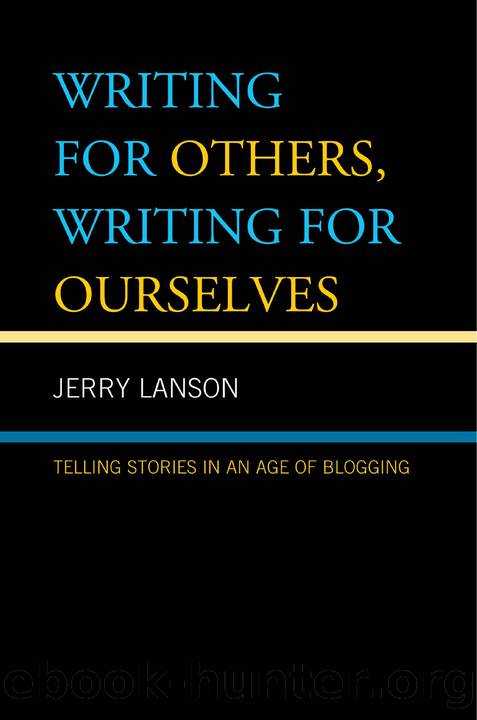Writing for Others, Writing for Ourselves by Jerry Lanson

Author:Jerry Lanson
Language: eng
Format: epub
Publisher: Rowman & Littlefield Publishers
Published: 2011-10-15T00:00:00+00:00
Show Up
Stories canât be built on a foundation of fancy words any more than high-performance sports cars can surge from zero to sixty because of great grill work and a shiny paint job. They need an engine; the content and context of any story provide just that.
Decades ago, Gay Talese, considered the father of what was once known as âNew Journalism,â set out to write a profile of singer Frank Sinatra for Esquire magazine. Sinatra declined to be interviewed, but Talese persisted, following Sinatra wherever he could to observe the singerâto capture scene. Talese also interviewed just about anyone who would talk, from casual acquaintances of Sinatra to intimates and family members.
Once he had gathered a wealth of facts and details, Talese, the stylist, could take over. But what lets his story to this day stand among the great pieces of American magazine journalism is that each scene, each sentence, seems backed by hours of research and reporting. Talese showed up to watch the singer and to buttonhole those who knew him.
Hereâs how the 1966 classic, âFrank Sinatra Has a Cold,â began:
Frank Sinatra, holding a glass of bourbon in one hand and a cigarette in the other, stood in a dark corner of the bar between two attractive but fading blondes who sat waiting for him to say something. But he said nothing; he had been silent during much of the evening, except now in this private club in Beverly Hills he seemed even more distant, staring out through the smoke and semidarkness into a large room beyond the bar where dozens of young couples sat huddled around small tables or twisted in the center of the floor to the clamorous clang of folk-rock music blaring from the stereo. The two blondes knew, as did Sinatraâs four male friends who stood nearby, that it was a bad idea to force conversation upon him when he was in this mood of sullen silence, a mood that had hardly been uncommon during this first week of November, a month before his fiftieth birthday.
Sinatra had been working in a film that he now disliked, could not wait to finish; he was tired of all the publicity attached to his dating the twenty-year-old Mia Farrow, who was not in sight tonight; he was angry that a CBS television documentary of his life, to be shown in two weeks, was reportedly prying into his privacy, even speculating on his possible friendship with Mafia leaders; he was worried about his starring role in an hour-long NBC show entitled SinatraâA Man and His Music, which would require that he sing eighteen songs with a voice that at this particular moment, just a few nights before the taping was to begin, was weak and sore and uncertain. Sinatra was ill. He was the victim of an ailment so common that most people would consider it trivial. But when it gets to Sinatra it can plunge him into a state of anguish, deep depression, panic, even rage. Frank Sinatra had a cold.
Download
This site does not store any files on its server. We only index and link to content provided by other sites. Please contact the content providers to delete copyright contents if any and email us, we'll remove relevant links or contents immediately.
Whiskies (Collins Gem) by dominic roskrow(45236)
Spell It Out by David Crystal(36106)
Cecilia; Or, Memoirs of an Heiress — Volume 1 by Fanny Burney(32536)
Cecilia; Or, Memoirs of an Heiress — Volume 2 by Fanny Burney(31933)
Cecilia; Or, Memoirs of an Heiress — Volume 3 by Fanny Burney(31925)
Beautiful Disaster by McGuire Jamie(25313)
Trainspotting by Irvine Welsh(21631)
Chic & Unique Celebration Cakes by Zoe Clark(20051)
The Secret History by Donna Tartt(19017)
How High Can a Kangaroo Hop? by Jackie French(18790)
Twilight of the Idols With the Antichrist and Ecce Homo by Friedrich Nietzsche(18613)
All the Missing Girls by Megan Miranda(15915)
Cat's cradle by Kurt Vonnegut(15320)
Ready Player One by Cline Ernest(14628)
For the Love of Europe by Rick Steves(13845)
Fifty Shades Freed by E L James(13225)
4 3 2 1: A Novel by Paul Auster(12362)
Crooked Kingdom: Book 2 (Six of Crows) by Bardugo Leigh(12300)
Grundlagen Kreatives Schreiben (German Edition) by Helfferich Pia(10433)
